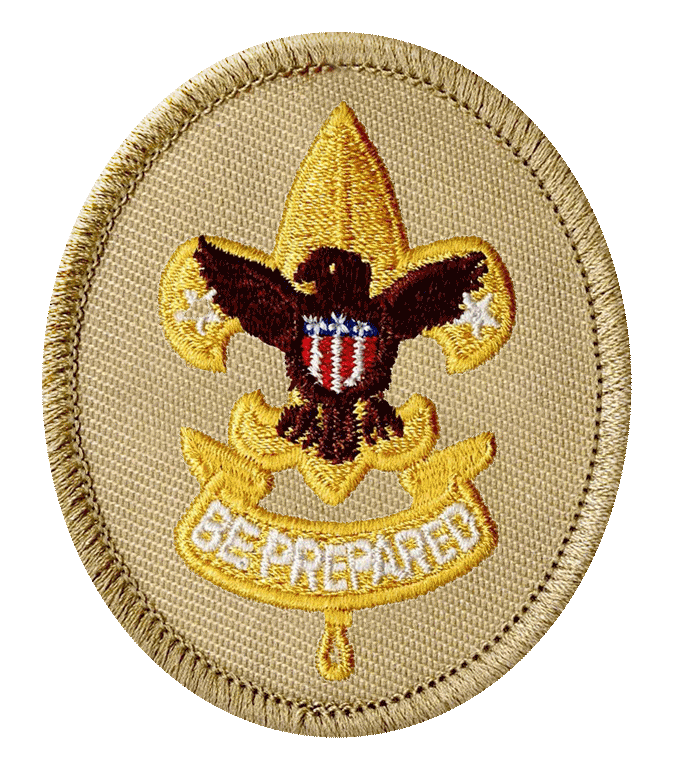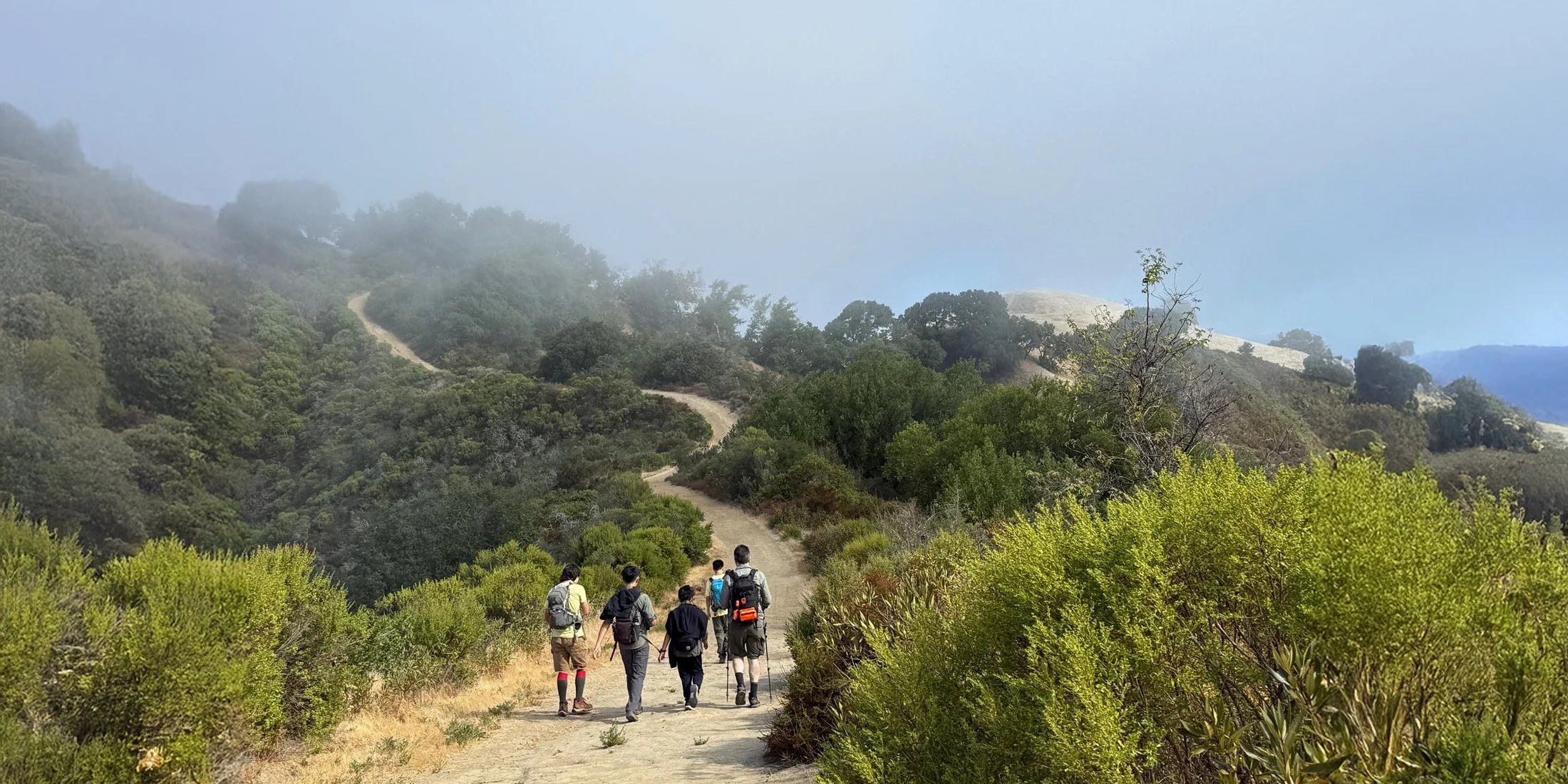Advancement
Prepare the child for the path, not the path for the child
It is important to remember that Advancement is not a goal in Scouting;
it is one of the methods used to deliver on the Aims of Scouting.
Advancement as a Method
Who Approves Rank Requirements?
Youth leaders approve rank requirements up to First Class. As Scouts work with one another, learning takes place on both sides. Adult leaders provide oversight to ensure the process is fair and honest.
Adult leaders approve rank requirements for Star, Life, and Eagle. These ranks place emphasis on leadership, citizenship, and personal responsibility.
Parents and guardians are involved at home encouraging, mentoring, and supporting. They also conduct Boards of Review. They do not sign off rank requirements.
Scouts master skills and concepts as a means of personal growth. Learning how to tie a knot, plan a menu, pack for a camping trip, or administer first aid are important and useful skills, but they are secondary to the true goal of personal growth that comes from learning, practice, and personal responsibility.
Scouts BSA is geared towards individual effort and personal initiative. Rather than completing activities, as they may have done as Webelos, Scouts acquire life-long skills through fulfilling rank requirements. A rank does not simply represent what a Scout has done, but rather what he is capable of doing. He should be able to demonstrate or teach any of his early rank skills as a senior Scout. This is a crucial difference between Webelos and Scouts, and highlights why Scouts must be individually evaluated for advancement.
Requirements are not normally taught and signed off in a classroom-style setting at weekly meetings. Each Scout must learn to research and understand the requirements for each rank; plan how, when, and where they’ll complete those requirements; ask adult leaders or senior Scouts to teach him skills if necessary; practice the skills; then arrange for an adult leader or qualified Scout to watch them perform the skill and sign it off in the back of their binder. Some of these skills must be completed at campouts and require planning by the Scout ahead of time.
Ranks vs. Merit Badges
Ranks and Merit Badges are both components of advancement. Each serves a different purpose.
Ranks are progressive levels of advancement in the Scouts BSA program. Progressing in rank represents a growing understanding of leadership, citizenship, and Scoutcraft. As a troop we encourage—and create opportunities for—every Scout to progress to First Class. Advancing beyond First Class will require more initiative on behalf of the Scout.
Merit badges are individual awards earned by completing requirements in specific skill or subject areas. They are designed to recognize Scouts for exploring new interests and pursuing independent learning. Earning merit badges is required to achieve Second Phase ranks.
First Phase Ranks
These ranks focus on the fundamental skills of Scouting. A Scout may complete requirements for these ranks in virtually any order, but the ranks must still be earned in sequence: Scout, Tenderfoot, Second Class, First Class.
-

Scout Rank
The Scout rank is the first rank of Scouting. To earn the rank, a new Scout be able to recite the Pledge of Allegiance, demonstrate the Scout sign, salute, and handshake, tie a square knot, and describe the Scout badge.
Finally, he must understand and agree to live by the Scout Oath, Law, Motto, Slogan, and the Outdoor Code.
-

Tenderfoot
Tenderfoot is the second rank of Scouts.
To earn the Tenderfoot rank, a Scout must complete requirements related to camping, hiking, and cooking. They must pack for and attend a campout, understand the patrol method and buddy system, and complete a physical fitness regimen. Tenderfoot Scouts master additional knots and basic first aid.
-

Second Class
The Second Class rank expands on a Scout’s outdoor and Scoutcraft skills, including building campfires, planning and cooking meals, using a map and compass, and swimming and water rescue skills.
The Second Class rank also introduces topics dealing with personal safety, drug and alcohol use, and managing money.
-

First Class
A First Class Scout is considered “fully Scout trained.”
Requirements include Scoutcraft skills including the seven basic knots, learning about weather, how to use a GPS unit, canoeing or kayaking, more advanced first aid and rescue techniques, and civic issues like constitutional rights and obligations.
Second Phase Ranks
This phase of Scouting is designed to help Scouts develop leadership skills and broaden their knowledge. Scouts must meet active participation thresholds—attend 70% of troop meetings and 50% of outings. Leadership roles require documented accomplishments reviewed bi-monthly.
-

Star
The requirements for the Star rank are much different than the previous ranks. Now, the focus shifts to leadership and citizenship, with requirements for being active in their troop and patrol, performing service work, and serving in a leadership position in the Troop. Scouts must also earn 6 merit badges, including 4 from those required for Eagle.
-

Life
The requirements for the Life rank are similar to those of the Star rank. To earn the Life rank, a Scout must be active in their troop and patrol for at least 6 months after earning Star, earn 5 additional merit badges, including 3 more from those required for Eagle, complete service projects totaling at least 6 hours of work, and serve in a leadership position in the Troop for at least 6 months.
-

Eagle Scout
Eagle is the highest rank a Scout can achieve. Earning the rank of Eagle requires earning an additional ten merit badges for a minimum of 21, 14 of which are in specific subjects. More than any other rank, Eagle is self-directed, including a minimum 6 months in a leadership position and proposing, designing, and executing a capstone Eagle service project. Most Eagle projects take 6-months to a year to complete.
The Pace of Advancement
There is no official timeline for advancement. Every Scout’s journey is their own, based on ability, interests, ambition, maturity, and a multitude of factors that make them unique.
Scouts set their own pace for advancement, but they don’t do it without guidance from adult leaders. For example, a Scout whose pace is slow because they are disorganized might be encouraged to make progress as a means of becoming better at personal management. A Scout who is advancing rapidly might be encouraged to slow down to fully learn skills or have time to experience and practice leadership. In both examples advancement is used as a method to encourage the goal of personal growth.
Scouts BSA is a 7-year program. It is perfectly normal for Scouts to advance at very different paces. Desire, initiative, and self-discipline are qualities we want them to develop; it is important that adults not short-circuit this growth by pushing advancement as a goal.
With that in mind, here are some general guidelines for each milestone in the advancement journey:
-
A good target to reach First Class after becoming a Scout is about 12–18 months. This gives new Scouts some early “wins’ and helps get them get excited about Scouting.
Although it is possible to meet the minimum requirements in as little as 9 months, “cramming for the test” generally means that knowledge isn’t retained. The most successful Scouts are those who embrace a discipline of practice to achieve mastery. This takes time. -
Spending about a year at each of these ranks is not uncommon. Star and Life ranks shift the emphasis away from practical skills and knowledge to focus on citizenship, service, and leadership. Technically, Star can be achieved in as little as 4 months. Life can be achieved in as little as 6 months after that.
This is an experiential phase in a Scout’s advancement journey. We’ve seen that slowing the pace helps Scouts more fully experience and understand the nuances of leadership, the complexities of citizenship, and develop positive, effective habits that stick. It also gives them time to enjoy Scouting.
-
An appropriate pace from Life to Eagle is typically 12–18 months. Many take much longer. Others start working on their Eagle Project as soon as they achieve their Life rank, making it conceivable to reach Eagle in as little as 6 months.
Realistically, most Eagle Projects take 6 to 8 months, start to finish.
Ideally, a Life Scout will spend some time enjoying the program at the Life rank. They will have a leadership role in the troop; that should be their focus for at least the first 6 months before turning their focus on their Eagle Project (it will also help them be prepared to lead and manage their project independently).
Frequently Answered Questions
-
First phase ranks (Tenderfoot, Second Class, First Class) focus on Scout skills. These are the foundational skills Scouts will need to succeed on outings and be safe in the outdoors.
Second phase ranks focus on leadership and citizenship. These ranks also require Scouts to earn merit badges and serve in a position of responsibility in the troop.
-
Ranks are not a hierarchy the way they are in the military. They are symbols that recognize personal achievement.
A Star Scout is not “above” a First Class Scout in terms of authority. They are “senior” in the sense that they have attained more skills and, generally, have more experience.
-
A First Class Scout is considered “Scout Trained” and has the basic skills needed to succeed in the program.
First Class Scouts are eligible for leadership positions.
-
Scouts join the program at different ages. A Scout who demonstrates good character, is an engaged citizen, is physically fit, and practices the qualities of servant leadership has had a successful Scouting career, regardless of what rank they attain.
With that in mind, we encourage all Scouts to push themselves, engage in all troop activities, and learn new skills at a pace that fits their lifestyle and maturity. Doing this naturally leads to advancement.
-
Wrong question, friend.

